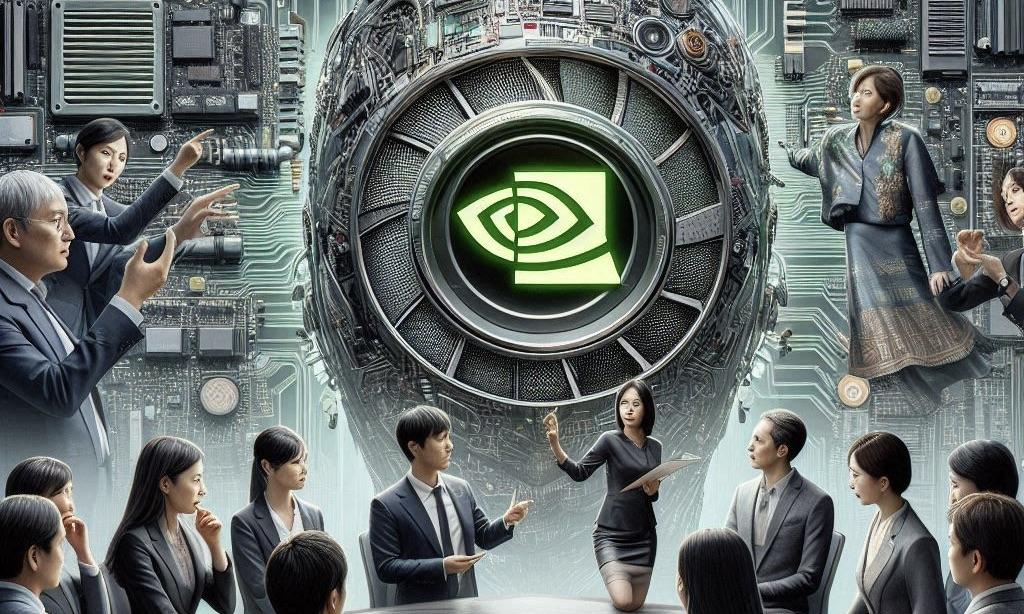At the Goldman Sachs Communacopia + Technology conference, NVIDIA CEO Jensen Huang revealed the company's ability to pivot from its primary supplier, TSMC, if necessary. Huang emphasized that NVIDIA remains poised to capture opportunities in a $1 trillion market beyond AI.
NVIDIA CEO Highlights Future Growth, Supply Chain Flexibility, and Opportunities Beyond AI at Conference
NVIDIA CEO Jensen Huang disclosed critical insights regarding the organization's future at the Goldman Sachs Communacopia + Technology conference. This event resulted in a 10% increase in NVIDIA's stock price, which opened higher on September 12. Even though the broader industry has not fully adopted artificial intelligence (AI), Huang emphasized that the demand for NVIDIA's products will remain sustainable due to the fundamentals of semiconductor fabrication.
Huang also elaborated on NVIDIA's capacity to mitigate potential supply chain disruptions, stating that the company has improved its semiconductor design capabilities to guarantee the continued provision of GPUs by swapping partners if necessary, particularly in the event of a disruption with its primary manufacturing partner, TSMC.
Huang initiated the discussion regarding AI's influence on NVIDIA's expansion by imagining a scenario in which AI does not exist. He clarified that the constraints of general-purpose computing would continue to exist, even without artificial intelligence, because the physical principles that underlie Denard scaling and transistor shrinkage are no longer viable. Consequently, Huang thinks that the industry will no longer witness the annual doubling of the performance of CPUs or general-purpose computers. He emphasized that, in the current environment, companies must not wait for CPUs to become speedier; instead, they must account for "computation inflation."
Huang recommended that industries prioritize accelerating all processes, including SQL processing, data processing, and recommender systems, to adjust to this reality. He believes that this requirement for accelerated computation is the least risky market opportunity for NVIDIA.
NVIDIA CEO Discusses Data Center Transformation, Cost Efficiency, and Supply Chain Resilience Strategies
Huang asserts that transforming the world's general-purpose data centers into accelerated computing centers is unavoidable, as Moore's Law is no longer the primary factor propelling performance improvements. He clarified that this transition would result in the "densification of computers," which involves consolidating enormous data centers into significantly smaller, more efficient facilities.
Huang emphasized the cost-saving advantages of NVIDIA's server racks, which may appear costly at first glance—possibly costing millions of dollars per rack—but supplant thousands of nodes in outdated systems. In addition, he observed that the cost of cabling for antiquated systems frequently surpasses the cost of consolidating into a single rack. He also mentioned that densification facilitates more efficient liquid cooling in data centers.
Huang compared the complexity of modern GPUs to earlier products he had designed in response to a query about how NVIDIA would manage potential disruptions in Asia. He clarified that the present-day GPUs comprise 35,000 components, weigh 80 pounds, and consume 10,000 amps. These GPUs are constructed like electric vehicles, weighing 3,000 pounds when stacked. The production ecosystem in Asia is highly interconnected and diverse.
To reduce risks, NVIDIA incorporates diversity and redundancy into every stage of its manufacturing process, guaranteeing the capacity to transfer production to an alternative facility in an emergency. Despite the potential for decreased performance or increased costs as a result of a manufacturing transition, Huang acknowledged that the company would continue to be able to supply products. He concluded by lauding TSMC, NVIDIA's primary partner, as the finest in the world by a substantial margin.



 Paramount Skydance Forecasts Soft Q1 Revenue as Streaming Growth Counters Linear TV Decline
Paramount Skydance Forecasts Soft Q1 Revenue as Streaming Growth Counters Linear TV Decline  Middle East Airspace Shutdown Disrupts Global Flights After U.S.-Israel Strikes on Iran
Middle East Airspace Shutdown Disrupts Global Flights After U.S.-Israel Strikes on Iran  Pentagon Weighs Supply Chain Risk Designation for Anthropic Over Claude AI Use
Pentagon Weighs Supply Chain Risk Designation for Anthropic Over Claude AI Use  Nintendo Share Sale: MUFG and Bank of Kyoto to Sell Stakes in Strategic Unwinding
Nintendo Share Sale: MUFG and Bank of Kyoto to Sell Stakes in Strategic Unwinding  FedEx Faces Class Action Lawsuit Over Tariff Refunds After Supreme Court Ruling
FedEx Faces Class Action Lawsuit Over Tariff Refunds After Supreme Court Ruling  Toyota Plans $19 Billion Share Sale in Major Corporate Governance Reform Move
Toyota Plans $19 Billion Share Sale in Major Corporate Governance Reform Move  Chime Forecasts Strong 2026 Revenue Growth, Shares Jump on Profit Outlook
Chime Forecasts Strong 2026 Revenue Growth, Shares Jump on Profit Outlook  FCC Approves Charter Communications’ $34.5 Billion Acquisition of Cox Communications
FCC Approves Charter Communications’ $34.5 Billion Acquisition of Cox Communications  Paramount Skydance to Acquire Warner Bros Discovery in $110 Billion Media Mega-Deal
Paramount Skydance to Acquire Warner Bros Discovery in $110 Billion Media Mega-Deal  Star Entertainment Secures Debt Refinancing Deal with WhiteHawk Capital to Boost Liquidity
Star Entertainment Secures Debt Refinancing Deal with WhiteHawk Capital to Boost Liquidity  Anthropic Refuses Pentagon Request to Remove AI Safeguards Amid Defense Contract Dispute
Anthropic Refuses Pentagon Request to Remove AI Safeguards Amid Defense Contract Dispute  Meta Signs Multi-Billion Dollar AI Chip Deal With Google to Power Next-Gen AI Models
Meta Signs Multi-Billion Dollar AI Chip Deal With Google to Power Next-Gen AI Models  OpenAI Hires Former Meta and Apple AI Leader Ruomin Pang Amid Intensifying AI Talent War
OpenAI Hires Former Meta and Apple AI Leader Ruomin Pang Amid Intensifying AI Talent War  Amazon’s $50B OpenAI Investment Tied to AGI Milestone and IPO Plans
Amazon’s $50B OpenAI Investment Tied to AGI Milestone and IPO Plans  Snowflake Forecasts Strong Fiscal 2027 Revenue Growth as Enterprise AI Demand Surges
Snowflake Forecasts Strong Fiscal 2027 Revenue Growth as Enterprise AI Demand Surges  Netflix Declines to Raise Bid for Warner Bros. Discovery Amid Competing Paramount Skydance Offer
Netflix Declines to Raise Bid for Warner Bros. Discovery Amid Competing Paramount Skydance Offer  Trump Orders Federal Agencies to Halt Use of Anthropic AI Technology
Trump Orders Federal Agencies to Halt Use of Anthropic AI Technology 































